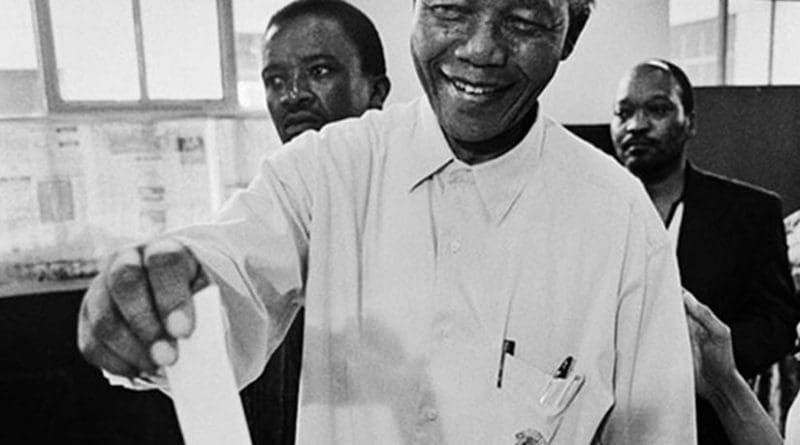Upholding Mandela’s Legacy – OpEd
By Ramzy Baroud
I had mixed feelings when I learned that Palestine has erected a statue of Nelson Mandela, the iconic South African anti-Apartheid leader. On the one hand, I was quite pleased that the unmistakable connection between the struggles of Palestinians and South Africans is cemented more than ever before. On the other hand, I dreaded that rich, corrupt Palestinians in Ramallah are utilizing the image of Mandela to acquire badly-needed political capital.
The six-meter bronze statue now stands in its own Nelson Mandela Square in Al-Tireh neighborhood in Ramallah, where the Palestinian Authority (PA) headquarters are based. The PA is known for its endemic political and financial corruption.
In some ways, its survival is both essential for the richest Palestinian class and also for the Israeli military occupation.
The statue was a gift from the City of Johannesburg, and its costs of R6 million was paid for by the people of that city, whose solidarity with Palestine is rooted in a long history, that of blood and tears, and the haunting cries of pain and freedom. At that, the gift is most appreciated.
But the Mandela that now stands erect in Ramallah has been incorporated into the zeitgeist of this city, particularly the rich and beaming neighborhood of massive white-stone villas and luxury cars. It would have meant much more if it had stood in the center of Gaza, a city that is withstanding an ongoing genocide; in the heart of Jenin, a town known for its bravery and hardship; in Al-Khalil, in Nablus or in Khan Younis.
Oddly enough, the main location of the Nelson Mandela Square and statue in Sandton City in Johannesburg is equally unsettling. I visited the place more than once, and despite my immense admiration for Mandela, it failed to move me.
The Mandela that is promoted by some in South Africa and their counterparts in Palestine is fundamentally different from the Mandela many of us knew about.
The name “Nelson Mandela” was a staple in my family, living in a dilapidated refugee camp in Gaza under military occupation and the constant threat of violence. We rushed to the television to watch whenever his name was mentioned in the news. The finest young men in camp were chased down, beaten, arrested and shot while trying to write his name on the decaying walls of our humble dwellings.
That was the Mandela I knew, and most Palestinians remember with adoration and respect. The one standing in Ramallah, unveiled by those Palestinians who speak proudly of conduction “security coordination” with Israel is a whole different Mandela.
He is a different Mandela because Abbas and his Authority do not, in the least, embody the spirit of Mandela the freedom fighter, the defiant prisoner, the unifying leader, the champion of a boycott movement. In fact, the Palestinian leadership as represented in the unelected government of Abbas in Ramallah, is yet to endorse the Palestinian civil society call for Boycott, Divestment and Sanctions (BDS).
Instead, Abbas’ PA has wasted 20 years over nonsensical and futile negotiations, collaborated with Israel, divided the ranks of Palestinians and is actively involved in suppressing Palestinian Resistance in the West Bank.
With his popularity falling to an all-time low among Palestinians, Abbas is desperate to concoct hollow victories and insists on presenting himself as a national liberation leader, despite all evidence to the contrary. But the bond between South Africa and Palestine is much greater than a photo-op in Ramallah, involving well-dressed men repeating insincere clichés about peace and freedom. I dare say it is bigger than Mandela himself, regardless of which legacy we insist on remembering him by. It is a link that has been baptized in the blood of the poor and the innocent and the tenacious struggle of millions of black and brown Africans and Palestinian Arabs.
I was fortunate enough to experience this for myself. In my last South African speaking tour a few years ago, I was approached by two South African men. They seemed particularly grateful for reasons that initially eluded me. “We want to thank you so much for your support of our struggle against apartheid,” one said with so much sincerity and palpable emotions.
It made sense. Palestinians saw the struggle of their black brethren as their own struggle. But the two men were not referring to sentimentalities. While the Israeli government, military and intelligence supported the apartheid government in many ways, the PLO had actually trained and equipped ANC fighters. Cuba and others did too, but to think that the then Palestinian leadership had the kind of political consciousness to extend a hand of solidarity to a nation fighting for its freedom, while the Palestinian people were themselves still enduring that same fight, filled me with pride.
Those men told me that they still hold onto their PLO-supplied military uniforms, even after all these years. We embraced and parted ways but, with time, I came to realize that the present struggle against apartheid in Palestine is not merely similar to that of South Africa. Both struggles are extensions of the same movement, the same fight for freedom and, in fact, against the same enemy.
When Nelson Mandela said, “We know all too well that our freedom is incomplete without the freedom of the Palestinians,” he was not trying to be cordial or diplomatic. He meant every word.
Someday, we hope that a statue of Mandela, one that represents the spirit of Resistance in Palestine, will stand tall amid the people who championed his cause and loved him most.

